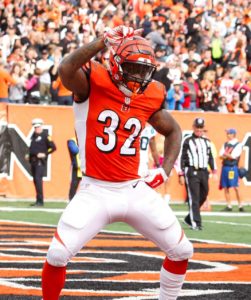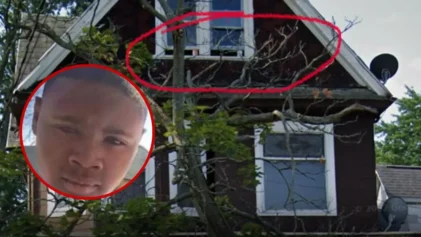
The NFL saw a surge in touchdown penalties last season after officials began strictly enforcing the celebration rules. (Photo by John Grieshop /Getty Images)
Once dubbed the “No Fun League,” the NFL will finally loosen its restrictions on the way players celebrate in the end zone.
The much-welcomed announcement came Tuesday, May 23, when league officials noted three key changes coming to the game this year. Naturally, the one concerning end-zone celebrations received the most attention.
“We are relaxing our rules on celebrations to allow players more room to have fun after they make big plays,” the league said in a statement.
For years, the NFL set limits on how players could celebrate after a touchdown and for how long. But things are a little different this year, as players will be allowed to use the ball as a prop in their touchdown dances, celebrate as a group and even roll around on the ground if they want to, according to NPR.
The Associated Press also reported that there’s no longer a set time limit on the duration of the celebrations. League officials are expected to review such celebrations during the preseason and provide guidance as the regular season moves forward.
The league isn’t completely abandoning its rules on end-zone celebrations, however. Players still will be punished for any gestures deemed offensive or in bad taste, including celebrations that ridicule the opposing team and/or imitate the use of a weapon.
The league caught a lot a flack last year following a sharp uptick in celebration penalties. For instance, Josh Norman of the Washington Redskins was fined last season after pretending to shoot a bow and arrow while the Pittsburgh Steelers’ Antonio Brown was penalized in Week 1 for twerking after a touchdown, and then again after doing a pelvic thrust three weeks later, The New York Times reported.
The surge in penalties came after the league instructed officials to crack down on enforcing existing rules. Some critics could not help but notice, however, that the majority of the players being hit with fines were African-American.
In 2012, researchers at Northwestern University’s Kellogg School of Management conducted an experiment testing whether racial bias played a role in unsportsmanlike-conduct penalties following touchdowns. They concluded that the pattern of Black people being punished more than whites held true in the NFL.
“I would conclude that the results are generalizable to NFL referees,” said Robert W. Livingston, an associate professor of management and researcher of the study.
Other changes announced by the NFL Tuesday included modifications to overtime periods and the Super Bowl hosting schedule. Owners slashed the overtime play period from 15 minutes to 10 minutes for all games out of concern that players were too worn out at the end of the period, NPR reported.
The league’s Super Bowl hosting schedule also shifted, with Tampa, Fla., set to host the 2021 game. The annual event was originally going to take place in Los Angeles. L.A. will now host the 2022 game.


